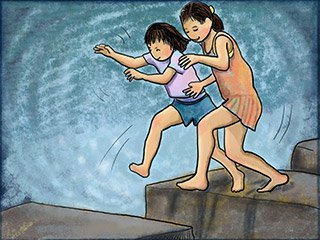Mental Health Conditions & Illness
It is normal for us to have periods where we are worried about things, feeling sad or stressed, especially as adolescents. However, it starts to become a mental health problem when it affects your ability to live a healthy life, doing the things we need and want to do and having good relationships. When this becomes very severe, a person may be experiencing a ‘mental illness’ or ‘mental health condition’.
Just as there are different types of physical illness, there are many different types of mental illnesses, some more common than others.
Common mental illnesses especially for adolescents include ‘depression’ and ‘anxiety disorders’.
Depression
It’s normal for adolescents and young people to experience bouts of sadness or mood swings. After all your adolescence years are when your hormones are changing. You are often in-between the stage of being too old to participate in certain activities – yet too young to be considered an adult or mature enough to participate in other activities. Everything is changing and you feel the pressures of being in-between.
Sometimes depression in young people might be hard to spot however a person may experience:
- Feeling sad, tearful, moody or irritable – and feel ‘empty’ or ‘numb’ most of the time, which can also be worse in the morning hours
- Lack of enjoyment in activities that they previously liked to do
- Having angry outbursts that are out of character
- Feeling worthless, or guilty and blaming themselves for things outside of their control they may say things like ‘it’s all my fault’ or ‘I’m a failure’
- Stopping seeing friends or going to social activities
- Having negative thoughts that don’t go away, including thoughts about death and hurting or killing themselves – they may think or say things like: ‘life’s not worth living’ or ‘i can’t do this anymore’.
Depression can also cause physical symptoms such as:
- tiredness, low in energy and motivation
- changes in appetite or weight
- vague or unexplained physical problems – for example, stomach aches and headaches
- sleeping problems – for example, difficulty getting or staying asleep, waking very early in the morning or oversleeping during the day
Experiencing depression also causes:
- difficulty concentrating
- difficulty making decisions and solving problems
- difficulty remembering information.
To be diagnosed with depression you will usually need to be seen by a professional who has been specially trained. You would need to be experiencing several of these signs and symptoms over several weeks.
Anxiety
Anxiety itself is a normal reaction to a situation where we think there may be danger, trouble, threat or something unpleasant about to happen. When we become anxious, we have both emotional and physical reactions for example we may feel on edge, uneasy or nervous or even fear and panic. Physically we may notice things like our breathing is a bit quicker than usually, our heartbeat is faster or we may feel more sweaty and physically tense in our bodies.
Experiencing anxiety is very common in adolescence years because at this time young people are faced with many changes and new experiences, opportunities and challenges. Things can be a little chaotic during adolescent years with constant demands and at times it feels out of control. Getting these feelings of anxiety is therefore understandable.
However, anxiety becomes a problem or type of mental illness however when it is excessive, when the feelings and sensations are happening without there being a clear threat or danger and the experiences overwhelm a person and stop them being able to cope with everyday life.
In extreme circumstances a person may experience something called a ‘panic attack’ which is when out of the blue a person has a sudden onset of severe physical symptoms of anxiety that can include a pounding heart, shortness of breath, dizziness, numbness, or tingling feelings. When these happen, the person may think they are about to have a heart attack or even die, they are so scary. Even though very scary panic attacks are not life-threatening.
Tips for dealing with anxiety
When you are experiencing anxiety the first thing to do is recognize and acknowledge what is going on and understand that it is normal to feel anxious at times and not to worry about it too much. Worrying will only increase the anxiety!
Other things to help reduce your anxiety include:
- Let someone you trust know how you are feeling and try to work out what it is that may be contributing to these feelings – what is the threat or the things worrying you? Try to name them all, even if they seem small or silly.
- Try to do some activities that will help you to relax your mind and body, gentle exercise is good, or doing something you enjoy. Singing out loud to your favourite music is a really good activity!
- Learn and Practice deep breathing – use this LINK to learn how to do it.
- Don’t totally avoid doing things that worry or stress you but get support for these from someone you trust and start small. Set small goals and building up to the more difficult things once you have achieved the first goals.
- Remember to recognise your attempts to overcome your anxiety, even if you only partially succeed. It’s hard to face fear!
- Remind yourself that many other adolescents are also probably experiencing anxiety at times and that it is normal to go through a variety of emotions. In fact, this is part of growing up, learning to deal with these situations and it’s the path to adulthood.
- If your anxiety is very extreme seek help from your school counsellor, Dr or helpline use this LINK to find our services near you.
Average Rating: ☆ ☆ ☆ ☆ ☆ (0 reviews)


